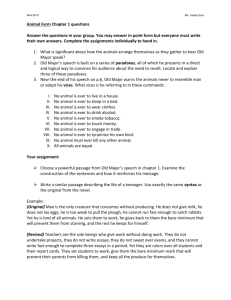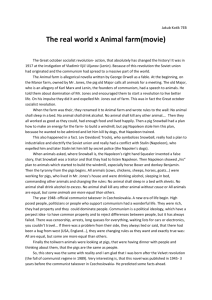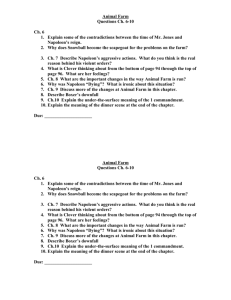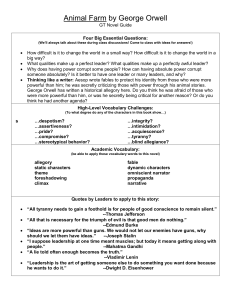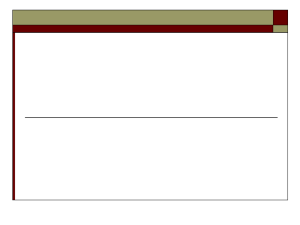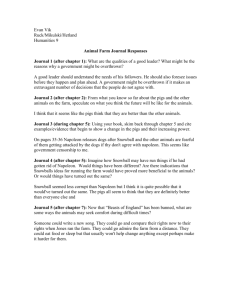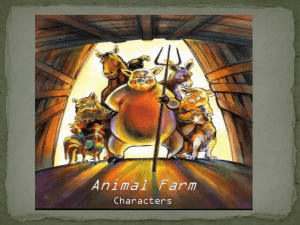Animal Farm Chapter 1 questions
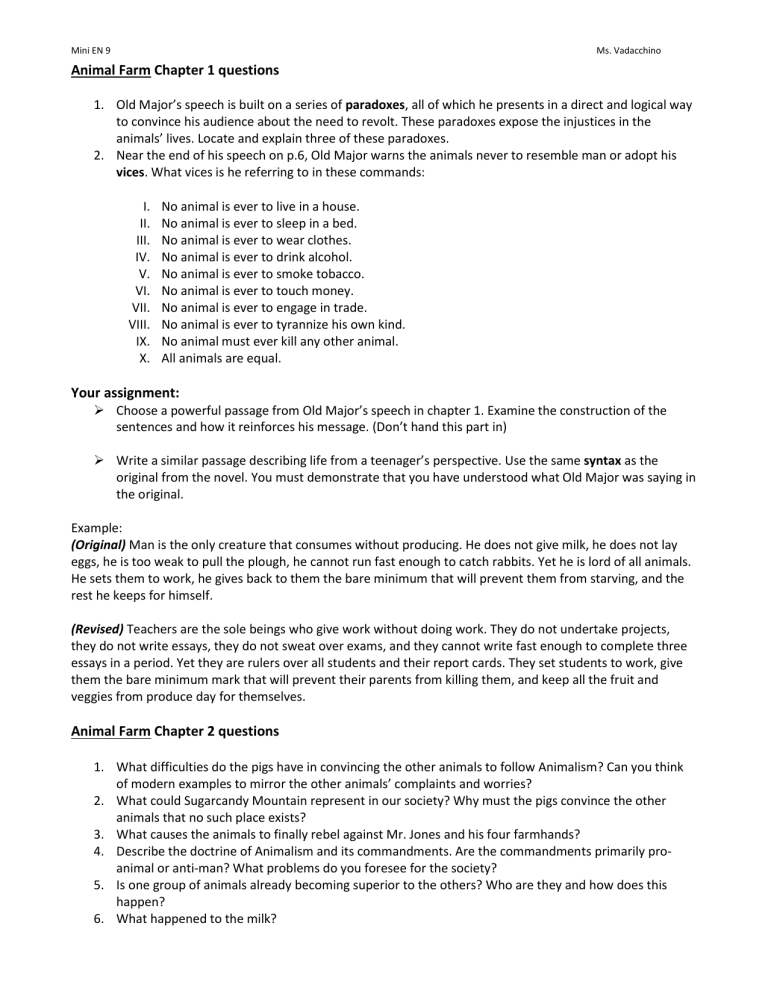
Mini EN 9
Animal Farm Chapter 1 questions
Ms. Vadacchino
1.
Old Major’s speech is built on a series of paradoxes, all of which he presents in a direct and logical way to convince his audience about the need to revolt. These paradoxes expose the injustices in the animals’ lives. Locate and explain three of these paradoxes.
2.
Near the end of his speech on p.6, Old Major warns the animals never to resemble man or adopt his
vices. What vices is he referring to in these commands:
I.
No animal is ever to live in a house.
II.
No animal is ever to sleep in a bed.
III.
No animal is ever to wear clothes.
IV.
No animal is ever to drink alcohol.
V.
No animal is ever to smoke tobacco.
VI.
No animal is ever to touch money.
VII.
No animal is ever to engage in trade.
VIII.
No animal is ever to tyrannize his own kind.
IX.
No animal must ever kill any other animal.
X.
All animals are equal.
Your assignment:
Choose a powerful passage from Old Major’s speech in chapter 1. Examine the construction of the sentences and how it reinforces his message. (Don’t hand this part in)
Write a similar passage describing life from a teenager’s perspective. Use the same syntax as the original from the novel. You must demonstrate that you have understood what Old Major was saying in the original.
Example:
(Original) Man is the only creature that consumes without producing. He does not give milk, he does not lay eggs, he is too weak to pull the plough, he cannot run fast enough to catch rabbits. Yet he is lord of all animals.
He sets them to work, he gives back to them the bare minimum that will prevent them from starving, and the rest he keeps for himself.
(Revised) Teachers are the sole beings who give work without doing work. They do not undertake projects, they do not write essays, they do not sweat over exams, and they cannot write fast enough to complete three essays in a period. Yet they are rulers over all students and their report cards. They set students to work, give them the bare minimum mark that will prevent their parents from killing them, and keep all the fruit and veggies from produce day for themselves.
Animal Farm Chapter 2 questions
1.
What difficulties do the pigs have in convincing the other animals to follow Animalism? Can you think of modern examples to mirror the other animals’ complaints and worries?
2.
What could Sugarcandy Mountain represent in our society? Why must the pigs convince the other animals that no such place exists?
3.
What causes the animals to finally rebel against Mr. Jones and his four farmhands?
4.
Describe the doctrine of Animalism and its commandments. Are the commandments primarily proanimal or anti-man? What problems do you foresee for the society?
5.
Is one group of animals already becoming superior to the others? Who are they and how does this happen?
6.
What happened to the milk?
Mini EN 9
Assignments:
Ms. Vadacchino
1.
While addressing a serious topic on one level, the plot and narration of Animal Farm is actually very funny. And by funny I don’t mean obvious jokes; I mean ironically funny, pathetically funny, or funny because it exposes a stupidity in society. Identify passages and scenes that you find especially funny and explain why they are funny. You will be doing this for the rest of the novel.
2.
Tracking propaganda. Go back over chapter 1 and look for examples of propaganda. Refer to the
“Propaganda Techniques” handout and find one example of propaganda from each chapter. The best way to do this is make a chart. List the example of propaganda with page numbers, the type of propaganda, and an explanation of how it works. You will be doing this for the rest of the novel.
Animal Farm Chapter 3 questions
1.
How do the pigs gain the rights to the cow’s milk? Why do the other animals allow this to occur? What does this event suggest about the power hierarchy on the farm?
2.
What further examples of the difference between the pigs and the other animals occur in this chapter?
3.
What are Napoleon’s ideas about education?
4.
How is Squealer able to convince the other animals to accept whatever Napoleon decides?
5.
What techniques does Orwell use to cast doubt on the likelihood of a successful revolution?
Animal Farm Chapter 4 questions
1.
What is Snowball’s part in the Battle of the cowshed? Characterize him as a leader.
2.
Where is Napoleon during the battle? What does this tell you about his character?
Animal Farm Chapter 5 questions
1.
Why does Mollie defect (abandon one's country or cause in favour of an opposing one) from Animal
Farm to Foxwood? What does this tell you about her character? Disregarding her motivations for defecting, do you think she is better or worse off at Foxwood? Explain? Can you think of a human situation where this might occur? Would your opinion change if Mollie were human?
2.
What changes are made to the weekly Meetings in this chapter?
3.
Explain the windmill controversy from Snowball’s point of view.
4.
Explain the windmill controversy from Napoleon’s point of view.
5.
How does each pig argue his side at the Meeting (starting on bottom of p. 34)? What tactics do they use? (Don’t just summarize the arguments – identify the strategies they use) What does this say about each pig as a leader?
6.
Explain the debate over defence of the farm.
7.
How do the animals arrange themselves now when they enter the barn to receive their orders compared to chapter 1?
8.
What was Napoleon’s plan for the windmill all along? Review his behaviour and comment.
Assignment:
Complete the Animal Farm Character Sheet
You may use point form in this sheet, but each point must be a complete sentence, as I will be assessing grammar. Under the Character traits column you must list as many as you can, using very specific vocabulary.
Under the Evidence column you must provide the evidence from the novel and explain how it proves you’re the character trait you have chosen.
Mini EN 9 Ms. Vadacchino
Animal Farm Chapter 6 questions
1.
Identify at least three examples of the success of Napoleon’s propaganda techniques.
2.
Why does Napoleon blame Snowball for the destruction of the windmill? What effect does it have on the animals?
Animal Farm Chapter 7 questions
1.
While there is still humour in the novel, it is now sad and rueful (look it up). How does the beginning of the second paragraph in chapter 7 fit this description? Find two other examples.
2.
What is so despicable about how Napoleon uses Mr. Whymper? Can you think of modern day examples (or just human examples) of such behaviour?
3.
Look up “infanticide”. How does this lie become a truth?
4.
The scene of the confessions is a very disturbing one. Why do you think the animals confess to being traitors?
5.
Explain why Clover is so sad at the end of the chapter.
6.
Why are the animals ordered to stop singing “Beasts of England”?
Assignment:
Complete the Historical Figure chart. You must explain how the character relates to the historical figure. You may use point form in this sheet, but each point must be a complete sentence, as I will be assessing grammar.
Provide examples of what the character says and does in the novel and compare this to what the historical figure did or how it functioned in history. Make the parallel very clear. Don’t assume I will do it for you.
Animal Farm Chapter 8 questions
1.
How is Napoleon becoming more and more like a typical dictator?
2.
How does the episode with the timber reveal how unsavvy (look it up – this is actually an informal word – you may not find the “un” version in the dictionary) Napoleon is?
3.
Why is the whisky incident so funny?
Assignment:
Choose one of the animals from the Animal Farm Character Chart and write a paragraph describing this animal’s personality traits. As usual, type or use blue or black ink and double space. I will be paying particular attention to grammar, vocabulary, and sentence structure. This is not a difficult paragraph in terms of ideas and analysis, so spend a lot of time editing and revising so the writing is perfect.
Animal Farm Chapter 9 questions
1.
Why is the final scene with Boxer so incredibly sad and pathetic? List as many reasons as you can. I have no energy for more questions after that.
Assignment:
Throughout the novel, the pigs keep changing the seven commandments to suit their purposes. Go back through the novel and make note of the re-written commandments. Now look at the edited version of the
Canadian Charter of Rights and Freedoms. In pairs rewrite four of the rights in the same manner Squealer rewrote the commandments. You may be a funny as you like, but try to keep in mind how difficult it really is to create a society where everyone is equal. Are these rights really put into practice? Try to expose some injustices in your versions.

